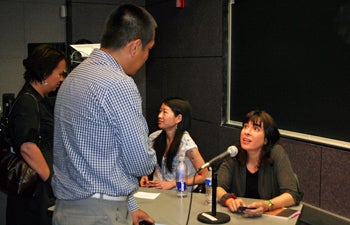One Night in Bangkok
Quoting from his memoir, Talk Thai: The Adventures of a Buddhist Boy, Ira Sukrungruang summed up the theme of the evening, his tongue firmly in cheek.
“I am Thai. Thais are superior to any other race,” the University of South Florida lecturer deadpanned. “Ask any Thai, and he or she will politely admit to it.”
Sukrungruang was among four of the country’s foremost Thai American authors who read from their works during a recent event sponsored by USC College’s Master of Professional Writing (MPW) Program and PEN Center USA. The event was part of PEN’s Customs and Departures series, which also featured Ethiopian American, Korean American and Persian American writers.
For the four first-generation writers, their well-defined cultural identity has had a profound impact on their works. Although, the degree of their immersion in the Thai culture varies.
Novelist Cherry Chevapravatdumrong, who writes and produces for the Fox animated series Family Guy, was born in Ohio, to Thai parents who immigrated to the United States for graduate school, then settled in the Midwest to raise their children. Chevapravatdumrong pulled from her own family background in her young adult novel She’s So Money, about a high school girl who works in her parents’ Thai restaurant. The plot involving a pay-for-homework scheme, however, is fiction.
Pimone Triplett, an associate professor at the University of Washington, read poems from her collections, The Price of Light and Rumor. Triplett, whose mother is Thai and father is a white man from Oregon, said she often writes from an outsider’s perspective. One of the poems she recited, “Story for the Mother Tongue (Bangkok to Chiang Mai)” begins:
“Went to see the there that was, for me, full latitudes, umpteen tracks of world away.”
Triplett speaks only a few words of Thai and learned very little about the Thai culture growing up. When she was in the graduate program at the University of Iowa, she hadn’t yet realized she could write about her mother’s heritage.
“It never occurred to me that I could write about Thailand, or my mother’s background,” said Triplett, who says she puts the “American in Thai American.” She didn’t feel she had the authority to write about the Thai culture until a professor encouraged her to use her perspective as an outsider in her poetry.

After the discussion, audience members chat with writers Cherry Chevapravatdumrong (left) and Pimone Triplett. Photo credit Megan Christopher.
Rounding out the panel was playwright Prince Gomolvilas, who teaches writing for the stage and screen in MPW. He called Bringing Down the House: The Inside Story of Six MIT Students Who Took Vegas for Millions by Ben Mezrich the greatest piece of Asian American literature ever written. The book is about a group of mostly Asian American card counters known as the MIT Blackjack Team.
He greatly disliked the book’s film adaptation, 21, and performed a comedic monologue he wrote titled, 21 Reasons Why This Movie Sucks.
“Reason number six: most of America never knew, and will never know, the act of complete cinematic white-washing that took place,” Gomolvilas said, referring to the film’s predominately white cast, including Jim Sturgess, who is British, playing the lead character based on Chinese American Jeffery Ma.
After the readings, the conversation turned to nicknames. Gomolvilas said that he was arbitrarily christened Prince by a kindergarten teacher in Indiana who struggled to pronounce Khamolpat, his given Thai name, and the moniker stuck.
Chevapravatdumrong’s parents gave her the nickname Cherry at birth, in keeping with a family tradition.
“All my cousins in Thailand are named after various fruits and animals,” she said. “In Thai they sound better, but there’s a Raisin, Apple, Chicken, Porcupine and Bear.”
When Sukrungruang asked his mother why she hadn’t given him a Thai name, she dismissed the question.
“Too long,” she replied. A reason he wrote his memoir, he said, was to empathize with his family’s struggles, dreams and fears as immigrants. Writing about his family was about trying to understand, not expose.
Several audience members mentioned how gratified they were to have an event of this kind. And the unique opportunity to see four Thai American writers in one place was not lost on the writers themselves. Gomolvilas said it’s easy to feel that you’re the only Thai writer around. Triplett elaborated:
“We need meetings like this that give us ways of talking about community.”
Brighde Mullins, MPW program director, called the reading an exhilarating event.
“The impetus to write comes from the desire to understand one’s own place in this world, and that desire was evident at this reading,” Mullins said. “By sharing their experiences, the Thai American writers reminded the audience that each text has a cartography. And one doesn’t need to be a writer to identify with this desire to place oneself.”